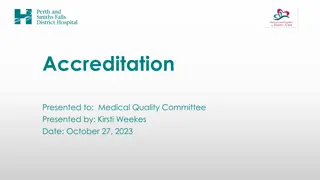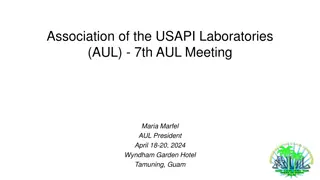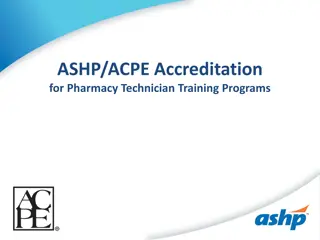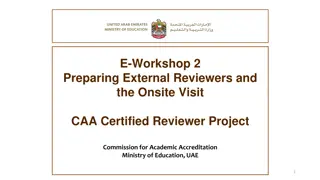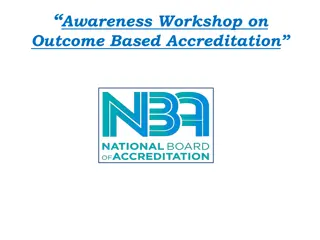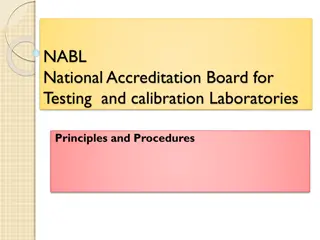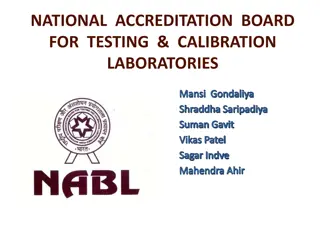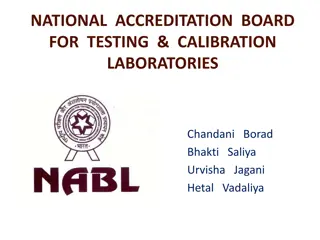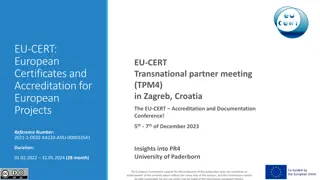Understanding Laboratory Accreditation of Analytical Laboratories
Laboratory accreditation ensures third-party certification of testing and calibration competence, providing formal recognition to laboratories. This accreditation allows customers to identify reliable services and ensures laboratories maintain technical competence. Accreditation bodies use specific criteria to evaluate laboratories regularly. NABL, an autonomous body in India, is the single accreditation body authorized by the Government for laboratory accreditation. The main objective of NABL is to assess the quality and technical competence of laboratories for government, industry associations, and industries.
Download Presentation

Please find below an Image/Link to download the presentation.
The content on the website is provided AS IS for your information and personal use only. It may not be sold, licensed, or shared on other websites without obtaining consent from the author. Download presentation by click this link. If you encounter any issues during the download, it is possible that the publisher has removed the file from their server.
E N D
Presentation Transcript
ACCREDITATION OF ANALYTICAL ACCREDITATION OF ANALYTICAL LABORATORIES LABORATORIES DTC-311 (Chemical Quality Assurance) Binod Kumar Bharti Assistant Professor cum Jr. Scientist Department of Dairy Chemistry Sanjay Gandhi Institute of Dairy Technology, Patna
Objective- How Accreditation of Analytical Laboratories ? Key words- Accreditation, Analytical Laboratories, NABL, ISO, IEC, Autonomous Body
Introduction Introduction The concept of laboratory accreditation was developed to provide for third-party certification of the competence of laboratories to perform a specific types of testing and calibration. Laboratory accreditation provides formal recognition to competent laboratories. It is providing for customers to identify and also select reliable testing, measurement and calibration services. To maintain formal recognition, laboratories are re-evaluated periodically by the accreditation body to ensure their continued compliance with requirements, and to check that their standard of operation is being maintained. Laboratory accreditation are uses the criteria and procedures specifically developed to determine technical competence.
First party Certification: Laboratory belongs to user, who is satisfied and used for his own jobs. Second Party Certification: Laboratory does not belong to user but user using his own means certifies the laboratory, and uses for his own requirements Third Party Certification: Certifying/ Accreditation body for laboratories, is neither the owner of the laboratory nor is the user.
The criteria are based on an international standard. These standards are called International standardization/ International Commission (ISO/IEC) 17025, which is used for evaluating laboratories throughout Organization Electrochemical for the world. Government of India (GOI) has authorized National Accreditation Board for Laboratories (NABL) as the single accreditation body for the purpose of accreditation of laboratories. Testing and Calibration Testing and Calibration NABL is an autonomous body under the guidance of Department of Science and Technology, Government of India, and it is also registered under the SocietiesAct.
The main objective of establishment of NABL to provide Government, Industry Associations and Industry for third-party assessment of the quality as well as technical competence of laboratories. testing and calibration NABL is a full member of both ILAC (International Laboratory Accreditation Cooperation) and APLAC (Asia Pacific Laboratory Accreditation Cooperation).
The Development of Laboratory Accreditation USA Australia New Zealand Denmark USA International conference 1941 1948 1973 1973 1976 1977 FDA Milk Testing Labs NATA IANZ STP/DANAK NVLP ILAC ISO/IEC Guide 25 Requirements for competence 1978 COFRAC CALA /SCC NAMAS/UKAS APLAC NABL EMA France Canada UK 1979 1980 1981 1992 1992 1998 Asia-Pacific Co-op India Mexico
Accreditation of Food Laboratories A food laboratory may be accredited for the following tests: In Food Products- - Sensory evaluation - Chemical Testing - Microbiological Testing - Micronutrients Analysis - Residues Analysis Microbiological condition of Food Factories Packaging Tests Shelf-life of Food Products Testing
Process of Accreditation Process of Accreditation There are 5 stages of Process of Accreditation Stage I First prepare laboratory's application for NABL accreditation, giving all required information and enlisting the name of tests and calibrations along with range and measurement. Laboratory can apply either for all testing or part of testing and calibration facilities. Laboratory has to take special care for filling the accreditation for which the laboratory wishes to apply. Laboratories are required to submit 3 sets of duly filled application forms for each field of testing and calibration along with two sets ofApplication Fees and Quality Manual.
NABL Secretariat on receipt of application will issue acknowledgement to the After scrutiny of application, a unique Customer Registration Number will be allotted to laboratory for further processing of application. Then NABL Secretariat shall nominate a Lead Assessor for giving Adequacy Report on the Quality Manual/Application submitted by the laboratory. A copy of Adequacy Report by Lead Assessor will be provided to Laboratory for taking necessary corrective action, if any. The laboratory shall submit Corrective Action After satisfactory corrective action by the laboratory, a Pre- Assessment audit of the laboratory will be organized by NABL. Laboratories must ensure by carrying out its internal audit before concern laboratory. Report (CAR). Pre-Assessment.
Stage II NABL Secretariat shall organize the Pre-Assessment audit, which shall normally be carried by Lead Assessor at the laboratory sites. The pre-assessment helps the laboratory to be better prepared for the Final Assessment. It also helps the Lead Assessor to assess the laboratory to undergo Final Assessment apart from Technical Assessor(s) and Total Assessment Man-days required and the scope of accreditation as per application submitted by the laboratory.
A copy of Pre-Assessment Report will be provided to laboratory for taking necessary corrective action on the concerns raised during The laboratory shall submit Corrective Action Report to NABL After laboratory confirms the completion of corrective actions, Final Assessment of the laboratory shall be organized by NABL. audit, if any. Secretariat.
Stage III NABL Secretariat shall organize the Final Assessment at the laboratory site(s) for its compliance to NABL Criteria and also appoint an assessment team. The Assessment Team shall comprise of a Lead Assessor and other Technical Assessor(s) in the relevant fields. Assessors shall raise the Non-Conformance(s), if any, and provide it to the laboratory in prescribed format. The Lead Assessor will provide a copy of consolidated report of the assessment to the laboratory and send the original copy to NABL Secretariat. Laboratory shall take necessary corrective action on the remaining Non Conformance(s) and shall submit a report to NABL within a period of 2 months.
Stage IV After satisfactory corrective action by the laboratory, the Accreditation Committee examines the findings of the Assessment Team and recommends additional corrective action, if any, by the laboratory. Accreditation recommendations in the assessment report are consistent with NABL requirements as well as commensurate with the claims made by the laboratory in its application. committee determines whether the Laboratory shall have to take corrective action on any concerns raised by the Accreditation committee.
Accreditation committee shall make the appropriate recommendations regarding accreditation of a laboratory to NABL Laboratories are free to appeal against the findings of assessment or decision on accreditation by writing to the Director, If possible NABL will depute its own technical personnel to be present at the time of assessment as Coordinator and NABL observer. Secretariat. NABL. Sometimes, NABL may depute a newly trained Technical Assessor, known as "Observer" of the laboratory to be assessed.
Stage V Accreditation to a laboratory shall be valid for a period of 2 years. NABL shall conduct periodical observation of the laboratory at intervals of one year. Laboratory shall apply for Renewal of accreditation to laboratory at least 6 months before the expiry of the validity of accreditation.
Benefit of accreditation To increase in business due to enhanced customer confidence and satisfaction. Savings in terms of time and money elimination of the need of retesting. It has better control of laboratory operations. To increase of confidence in testing / calibration data and personnel performing work. It is easy to identify the laboratories as per requirements. Users greater access of their products when tested by accredited labs. It is a harmonize analytical methods. Accreditation is to support defense under litigation or complexity.
Conclusion Laboratory accreditation provides formal recognition to competent laboratories, and providing for customers to identify testing and calibration facilities. It is uses criteria and procedures specially developed to determine by the technical competence. The criteria are based on an international standards of International Organization for Standardization/ International Electrochemical Commission (ISO/IEC) 17025, which is used for evaluating laboratories throughout the world. Government of India (GOI) has authorized National Accreditation Board for Testing and Calibration Laboratories (NABL) as the individual accreditation body for the accreditation of Testing and Calibration laboratories. NABL is an autonomous body, works under the Department of Science and Technology, Government of India. NABL is also registered under the Societies Act. Accreditation to a laboratory shall be valid for a maximum period of 2 years.
References 1. www.agrimoon.com 2. http://www.nabl-india.org/




